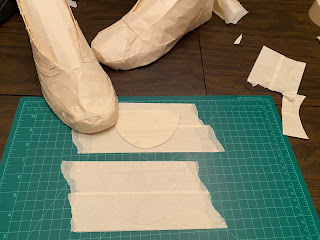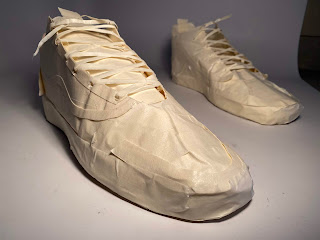Touch Pain
Photograph
Jpeg Image
Artist Theory
After reading the passage below I wanted to create a photo that described pain in the best way possible. The part where it talked about nerve pain is what I really wanted to capture. What better way to feel every single nerve in the most painful way possible? Well the first thing that came to mind was needles. I went ahead and set up a very flight led light above my hand and then proceeded to lightly sprinkle needles above my hand. I then went ahead and edited the photo to look very dark and blue and give off a painful depressing feeling. I think the result turned out very good.
"According to the pattern theory, nerve impulses combine to telegraph those Morse-code-like messages of pain. Some pains just rush to the spinal cord, so that we can flinch if we touch a hot stove; and we call this a reflex, by which we mean that, as we always suspected, we can act without thinking and we frequently do. Acute pain—a ripped ligament, a burn—hurts so badly that we’ll immobilize part of the body long enough for it to heal. A prick of the skin may not hurtthe most, but it hurts the fastest, the signal traveling to the brain at ninety-eight feet per second. Burning or aching travels slower (about six and a half feet per second). Leg pains sometimes travel at up to 290 miles per hour. We pay no attention to our internal workings unless something goes wrong, when we might feel hunger pangs, or headaches, or thirst. Still, scientists do not agree on exactly what pain is. Some say it’s a response of specific receptors to specific dangers—noxious chemicals, burning, stabbing or cutting, freezing—and others feel that it’s much more ambiguous, an extreme sensory stimulation of any kind, because, in the delicate ecosystem of our body, too much of anything will disturb the balance. So, in this sense, pain really is a sign that we’re out of harmony with Nature. When we’re in pain the localized place hurts but the entire body responds. We grow sweaty, our pupils dilate, our blood pressure shoots up. Oddly enough, the same thing happens when we’re angry or scared. There is a deep emotional component to pain. If we’re badly hurt, we might also be afraid. And what are we to make of those individuals who are sadomasochists, who combine pleasure with pain?"
Book- A Natural History Of the Senses
Author- Diane Ackerman
The Hand
Audio
Artist Theory
When reading this section I wanted to try and replicate a hand that has been through lots of hard work as a mechanic. I was originally going to grease my hand up and take a photo with a hammer in my hand but I wanted to try something different. I decided to make an audio video. When you think of a mechanics hand you immediately think of a hand that's all greased up and damaged. I think the audio turned out super good and I am overall happy with the assignment.
"Throughout history, palm-readers have chosen the hand as their symbolic link to the psyche and soul, as their raft through time. After all, the hand is action, it digs roads and builds cities, it throws spears and diapers babies. Even its small dramas—dialing a phone number, pushing a button—can change the course of nations or launch atomic bombs. When we are distressed, we allow our hands to console each other by wringing, stroking, fidgeting, and caressing them as if they were separate people. At the outset of a romance, the first touch people share is usually the taking of each other’s hand, while couples of long standing, moving through the world on their daily rounds, often hold hands as a tender bridge. Holding the hand of someone ill or elderly soothes them and gives them an emotional lifeline. Experiments show that just touching someone’s hand or arm lowers their blood pressure. In many cultures, people fiddle obsessively with worry beads, polished stones, and other objects, and the brain-wave patterns this produces are those of a mind made calm by repeated touch stimulation."
Book- A Natural History Of the Senses
Author- Diane Ackerman
Photograph
Jpeg Image
Artist Theory
After reading the passage below I wanted to create a photo that described pain in the best way possible. The part where it talked about nerve pain is what I really wanted to capture. What better way to feel every single nerve in the most painful way possible? Well the first thing that came to mind was needles. I went ahead and set up a very flight led light above my hand and then proceeded to lightly sprinkle needles above my hand. I then went ahead and edited the photo to look very dark and blue and give off a painful depressing feeling. I think the result turned out very good.
"According to the pattern theory, nerve impulses combine to telegraph those Morse-code-like messages of pain. Some pains just rush to the spinal cord, so that we can flinch if we touch a hot stove; and we call this a reflex, by which we mean that, as we always suspected, we can act without thinking and we frequently do. Acute pain—a ripped ligament, a burn—hurts so badly that we’ll immobilize part of the body long enough for it to heal. A prick of the skin may not hurtthe most, but it hurts the fastest, the signal traveling to the brain at ninety-eight feet per second. Burning or aching travels slower (about six and a half feet per second). Leg pains sometimes travel at up to 290 miles per hour. We pay no attention to our internal workings unless something goes wrong, when we might feel hunger pangs, or headaches, or thirst. Still, scientists do not agree on exactly what pain is. Some say it’s a response of specific receptors to specific dangers—noxious chemicals, burning, stabbing or cutting, freezing—and others feel that it’s much more ambiguous, an extreme sensory stimulation of any kind, because, in the delicate ecosystem of our body, too much of anything will disturb the balance. So, in this sense, pain really is a sign that we’re out of harmony with Nature. When we’re in pain the localized place hurts but the entire body responds. We grow sweaty, our pupils dilate, our blood pressure shoots up. Oddly enough, the same thing happens when we’re angry or scared. There is a deep emotional component to pain. If we’re badly hurt, we might also be afraid. And what are we to make of those individuals who are sadomasochists, who combine pleasure with pain?"
Book- A Natural History Of the Senses
Author- Diane Ackerman
The Hand
Audio
When reading this section I wanted to try and replicate a hand that has been through lots of hard work as a mechanic. I was originally going to grease my hand up and take a photo with a hammer in my hand but I wanted to try something different. I decided to make an audio video. When you think of a mechanics hand you immediately think of a hand that's all greased up and damaged. I think the audio turned out super good and I am overall happy with the assignment.
"Throughout history, palm-readers have chosen the hand as their symbolic link to the psyche and soul, as their raft through time. After all, the hand is action, it digs roads and builds cities, it throws spears and diapers babies. Even its small dramas—dialing a phone number, pushing a button—can change the course of nations or launch atomic bombs. When we are distressed, we allow our hands to console each other by wringing, stroking, fidgeting, and caressing them as if they were separate people. At the outset of a romance, the first touch people share is usually the taking of each other’s hand, while couples of long standing, moving through the world on their daily rounds, often hold hands as a tender bridge. Holding the hand of someone ill or elderly soothes them and gives them an emotional lifeline. Experiments show that just touching someone’s hand or arm lowers their blood pressure. In many cultures, people fiddle obsessively with worry beads, polished stones, and other objects, and the brain-wave patterns this produces are those of a mind made calm by repeated touch stimulation."
Book- A Natural History Of the Senses
Author- Diane Ackerman










